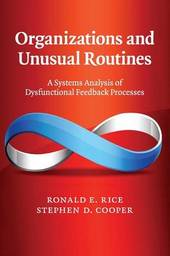
|
Organizations and Unusual Routines: A Systems Analysis of Dysfunctional Feedback Processes
Paperback / softback
Main Details
| Title |
Organizations and Unusual Routines: A Systems Analysis of Dysfunctional Feedback Processes
|
| Authors and Contributors |
By (author) Ronald E. Rice
|
|
By (author) Stephen D. Cooper
|
| Physical Properties |
| Format:Paperback / softback | | Pages:400 | | Dimensions(mm): Height 229,Width 152 |
|
| Category/Genre | Organizational theory and behaviour |
|---|
| ISBN/Barcode |
9781107683143
|
| Classifications | Dewey:302.35 |
|---|
| Audience | | Professional & Vocational | |
|---|
| Illustrations |
15 Tables, black and white; 4 Line drawings, unspecified
|
|
Publishing Details |
| Publisher |
Cambridge University Press
|
| Imprint |
Cambridge University Press
|
| Publication Date |
4 June 2015 |
| Publication Country |
United Kingdom
|
Description
Everyone working in and with organizations will, from time to time, experience frustrations and problems when trying to accomplish tasks that are a required part of their role. This is an unusual routine - a recurrent interaction pattern in which someone encounters a problem when trying to accomplish normal activities by following standard organizational procedures and then becomes enmeshed in wasteful and even harmful subroutines while trying to resolve the initial problem. They are unusual because they are not intended or beneficial, and because they are generally pervasive but individually infrequent. They are routines because they become systematic as well as embedded in ordinary functions. Using a wide range of case studies and interdisciplinary research, this book provides researchers and practitioners with a new vocabulary for identifying, understanding, and dealing with this pervasive organizational phenomenon, in order to improve worker and customer satisfaction as well as organizational performance.
Author Biography
Ronald E. Rice is Arthur N. Rupe Chair in the Social Effects of Mass Communication and Co-Director of the Carsey-Wolf Center for Film, Television, and New Media at the University of California, Santa Barbara. He is the author of several books, the most recent of which include The Internet and Health Care (with Monica Murero, 2006) and Media Ownership (2008). Stephen D. Cooper is Professor of Communication Studies in the Department of Communication Studies at Marshall University, where he teaches courses in business and professional communication, computer-mediated communication, group communication, organizational communication, and research foundations. He is the author of Watching the Watchdog: Bloggers as the Fifth Estate (2006).
Reviews"Rice and Cooper's book brings together the personal experience of organizational routines that leave us frustrated and puzzled with how such practices could possibly happen in the first place. The authors couple these experiences (some personal, some from case studies) with a range of theoretical ideas that helps us make sense of them. This book serves as a door opener for coding and understanding exasperating and common bureaucratic problems." -Larry Browning, Professor of Organizational Communication at the University of Texas at Austin, and Adjunct Professor of Business at the Bodo Graduate School of Business, Bodo, Norway "This is a must-read for anyone studying organizations! Unusual routines, systemic unintended consequences, and the need for organizations to engage in paradoxical practices are everywhere. Rice and Cooper show how one finds these phenomena in technology implementation, customer service, and a range of daily organizational practices. Yet they have been largely ignored by researchers - in large part because of a lack of vocabulary. This book fills this important gap with colorful case examples, theory, and conceptualizations. It will be an important classic." -Ann Majchrzak, Professor of Information Systems, Marshall School of Business, University of Southern California "Meet the enemies of organizational effectiveness and acquire the weapons for their destruction. Rice and Cooper methodically analyze the dysfunctional routines that sap the usefulness from organizational procedures and information systems. The absence of contextual understanding, perverse feedback loops, conflicting goals, and destructive panopticon effects are all part and parcel of the deep systems analysis of the case studies presented within the overarching theoretical framework in this book. You will learn how to avoid them. Rice and Cooper will lead you to wisdom in structuring organizational processes." -Vladimir Zwass, Gregory Olsen Endowed Chair and University Distinguished Professor of Computer Science and MIS, Fairleigh Dickinson University
|